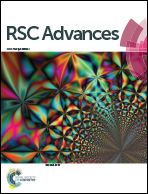Preparation and catalytic properties of poly(methyl methacrylate)-supported Pd0 obtained from room-temperature, dark reduction of ionic aggregates of the unstable Pd2+ solution ionomer
Abstract
A poly(methyl methacrylate)-supported Pd0 nanocatalyst was successfully prepared from solution reaction of Pd(CH3COO)2 with a copolymer acid, poly(methyl methacrylate-ran-methacrylic acid) (MMA–MAA). The reaction was carried out in a benzene/methanol mixed solvent in the dark at room temperature (∼25 °C) in the absence of a typical chemical reductant. There was coordination between the Pd0 nanoclusters and MMA–MAA, resulting in Pd0 nanoclusters being stably and uniformly dispersed in the MMA–MAA matrix, with an average particle size of ∼2.5 ± 0.5 nm. Mechanistically, it can tentatively be proposed that PMMA-ionomerization of the Pd2+ ions produces intramolecular –2COO−–Pd2+ aggregate cross-links in the solution. On swelling of the chain-segments that are covalently bound via multiple C–C bonds, the resultant elastic forces cause instantaneous dissociation at the O–Pd coordination bonds to give transient bare (i.e., uncoordinated), highly-oxidative Pd2+ ions and H+-associative carboxylate groups, both of which rapidly scavenge electrons and protons, respectively, of the active α-H atoms abstracted from the methanol molecules of the solvent to make Pd0 nanoclusters supported by the re-formed MMA–MAA. The MMA–MAA acid copolymer, without itself undergoing any permanent chemical change, serves as a mechanical activator or catalyst for the mechanochemical reduction of Pd(CH3COO)2 under mild conditions. Compared with traditional Pd/C catalysts, this Pd0 nanocatalyst exhibited more excellent catalytic efficiency and reusability in the Heck reaction between iodobenzene and styrene, and it could be easily separated. The supported Pd0 nanocatalyst prepared using this novel and simple preparation method may display high-efficiency catalytic properties for other cross coupling reactions.



 Please wait while we load your content...
Please wait while we load your content...